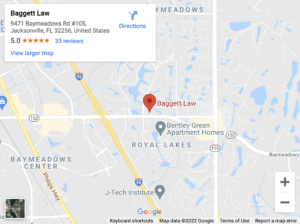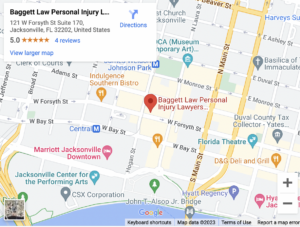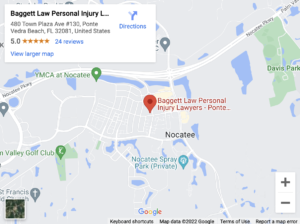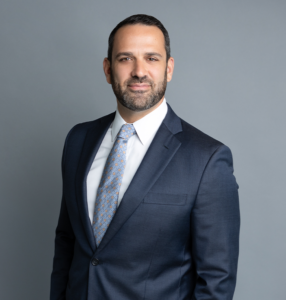
A car accident is a traumatic experience. It can be downright terrifying, however, if a child suffers an injury. When a car accident injures a child, it is important that you make all the right moves to minimize the damage done. The most important goals are to secure immediate medical care and to pave the way for an effective personal injury claim.
What’s Different About Child Victims?
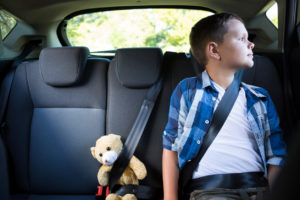
Because of the special needs and concerns of children (people under 18), they occupy their own special place in Florida law. Following are some of the pertinent differences when it comes to car accident claims:
- Young children cannot effectively communicate their symptoms, thereby presenting obstacles to medical treatment.
- Curtain injuries such as traumatic brain injury (TBI) might harm a developing brain more than they would harm an adult brain.
- The law does not hold young children legally liable for their actions.
- Children are fragile and more easily hurt than adults, both physically and emotionally.
- A parent, guardian, or caretaker can bear financial or criminal liability for failing to protect a child.
- Children cannot file lawsuits under their own name.
- Florida imposes restrictions on the management of settlement funds that compensate children for personal injury.
All of these differences can exert a decisive impact on a car accident claim.
Arrange for Prompt Medical Treatment
Securing prompt medical treatment for your child is more important than anything else, including any personal injury claim that might arise. When in doubt, seek treatment; remember that some injuries do not produce immediate symptoms. Call 911 and get your child to a hospital ASAP. Meanwhile, refrain from leaving the scene of the accident until the police arrive, and exchange contact and insurance details with the other driver.
After your child’s release from the hospital, watch them closely for symptoms of injury. This is doubly important if they are too young to talk.
Obtain a Copy of the Police Report
In Florida, a “police report” that a police officer files after a car accident is actually called a “crash record.” Unfortunately, you usually cannot use a crash record as evidence in court. The insurance company, however, will probably demand a copy. If its contents favor you, you are in luck. If they contradict your version of events, however, all is not lost. There are ways to fight back and protect your interests.
Settlement
Florida is a no-fault auto insurance state. This means that unless your injuries are serious, you must look to your own Personal Injury Protection (PIP) insurance to cover your child’s medical expenses. You cannot claim non-economic damages such as pain and suffering under PIP insurance. If you purchased the minimum PIP insurance, your child will enjoy up to $10,000 in coverage.
You initiate settlement by filing a PIP claim. You can dispute an insurance company’s response that you disagree with.
The Challenges of Florida’s No-Fault System
What if your child’s medical expenses exceed $10,000 and you lack the PIP insurance to cover it? At that point, you can try to exit the Florida no-fault system by claiming that your child’s injuries are “serious” under Florida law.
Florida law will accept this claim only if your child’s injuries meet certain specific legal standards, such as permanent disfigurement. Once you exit Florida’s no-fault system, you can sue the at-fault driver.
Lawsuit
If Florida allows you to exit the no-fault system, a lawsuit against the at-fault driver is possible. However, since liability insurance is not mandatory in Florida, you may run into a driver who lacks the resources to pay your claim.
Assuming that you can collect damages against the at-fault driver, Florida offers three possible forms of compensation to both child and adult victims–economic, non-economic, and punitive damages.
- Economic damages include compensation for tangible losses such as medical bills and other expenses.
- Non-economic damages compensate victims for psychological trauma, such as pain and suffering, mental anguish, and more. The availability of non-economic damages is one of the main reasons many people prefer lawsuits to PIP claims.
- Punitive damages. Florida courts award punitive damages reluctantly, and even then, only in cases of gross negligence or intentional misconduct. In the case of a child victim, a court’s outrage might be sufficient to trigger an award of punitive damages.
The court must approve any judgment for compensation. It will appoint someone (probably a parent) to manage the funds on behalf of the child. The court reserves the right to supervise the use of the funds, and it might place them in a restricted bank account.
Settlement
The great majority of personal injury victims resolve their claims through out-of-court settlements. Under Florida law, you can manage the settlement funds yourself if you settle for $15,000 or less. Even so, Florida expects you to use the money in the child’s best interests, not your own.
If the settlement exceeds $15,000, you need the court’s approval to finalize the settlement. The court also reserves the right to supervise your use of the settlement funds.
Filing a Lawsuit
A minor under 18 cannot file a lawsuit under their name. The court will, however, allow a parent or legal guardian to file such a lawsuit. The court reserves the right to appoint an appropriate party if the parent or guardian is unsuitable.
When the Child and Their Parent Are Adverse to Each Other
Suppose a child suffers a car accident injury (at least partly) because the child’s parent did not properly restrain the child in a car seat. Alternatively, suppose that the injured child was a passenger riding in a vehicle driven by their parent, and the accident was their parent’s fault.
In cases like these, it would be a conflict of interest for the at-fault parent to file a lawsuit on behalf of the child. Under these circumstances, the judge might select a third party to act as the child’s guardian ad litem for the purpose of a personal injury lawsuit.
Thinking About the Unthinkable: Wrongful Death Claims
If your child dies in an accident, the personal representative of the child’s probate estate (appointed by a Florida court) can file a wrongful death lawsuit for monetary damages, which go to the child’s close relatives.
You’ll Need a Jacksonville Car Accident Lawyer To Help You Through This
It is possible to resolve certain minor car accident claims without the assistance of a lawyer. Indeed, under certain circumstances, it is the right thing to do. When a legal complication is involved, however, legal assistance becomes important. The involvement of a child victim certainly qualifies as a legal complication and constitutes a situation where hiring a Jacksonville car accident attorney is likely in your best interest. Bagget Law Personal Injury Lawyers offers free initial consultations, contact us for more information at (904) 396-1100.


